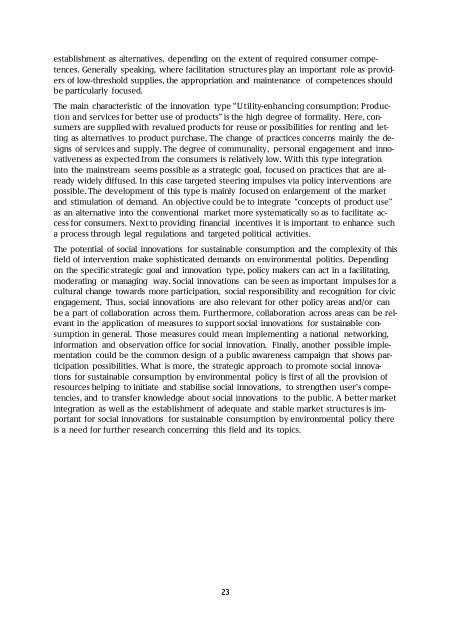40/2016 Nachhaltiger Konsum durch soziale Innovationen – Konzepte und Praxis
texte_40_2016_nachhaltiger_konsum_durch_soziale_innovation
texte_40_2016_nachhaltiger_konsum_durch_soziale_innovation
Erfolgreiche ePaper selbst erstellen
Machen Sie aus Ihren PDF Publikationen ein blätterbares Flipbook mit unserer einzigartigen Google optimierten e-Paper Software.
establishment as alternatives, depending on the extent of required consumer competences.<br />
Generally speaking, where facilitation structures play an important role as providers<br />
of low-threshold supplies, the appropriation and maintenance of competences should<br />
be particularly focused.<br />
The main characteristic of the innovation type “Utility-enhancing consumption: Production<br />
and services for better use of products” is the high degree of formality. Here, consumers<br />
are supplied with revalued products for reuse or possibilities for renting and letting<br />
as alternatives to product purchase. The change of practices concerns mainly the designs<br />
of services and supply. The degree of communality, personal engagement and innovativeness<br />
as expected from the consumers is relatively low. With this type integration<br />
into the mainstream seems possible as a strategic goal, focused on practices that are already<br />
widely diffused. In this case targeted steering impulses via policy interventions are<br />
possible. The development of this type is mainly focused on enlargement of the market<br />
and stimulation of demand. An objective could be to integrate “concepts of product use”<br />
as an alternative into the conventional market more systematically so as to facilitate access<br />
for consumers. Next to providing financial incentives it is important to enhance such<br />
a process through legal regulations and targeted political activities.<br />
The potential of social innovations for sustainable consumption and the complexity of this<br />
field of intervention make sophisticated demands on environmental politics. Depending<br />
on the specific strategic goal and innovation type, policy makers can act in a facilitating,<br />
moderating or managing way. Social innovations can be seen as important impulses for a<br />
cultural change towards more participation, social responsibility and recognition for civic<br />
engagement. Thus, social innovations are also relevant for other policy areas and/or can<br />
be a part of collaboration across them. Furthermore, collaboration across areas can be relevant<br />
in the application of measures to support social innovations for sustainable consumption<br />
in general. Those measures could mean implementing a national networking,<br />
information and observation office for social innovation. Finally, another possible implementation<br />
could be the common design of a public awareness campaign that shows participation<br />
possibilities. What is more, the strategic approach to promote social innovations<br />
for sustainable consumption by environmental policy is first of all the provision of<br />
resources helping to initiate and stabilise social innovations, to strengthen user’s competencies,<br />
and to transfer knowledge about social innovations to the public. A better market<br />
integration as well as the establishment of adequate and stable market structures is important<br />
for social innovations for sustainable consumption by environmental policy there<br />
is a need for further research concerning this field and its topics.<br />
23


